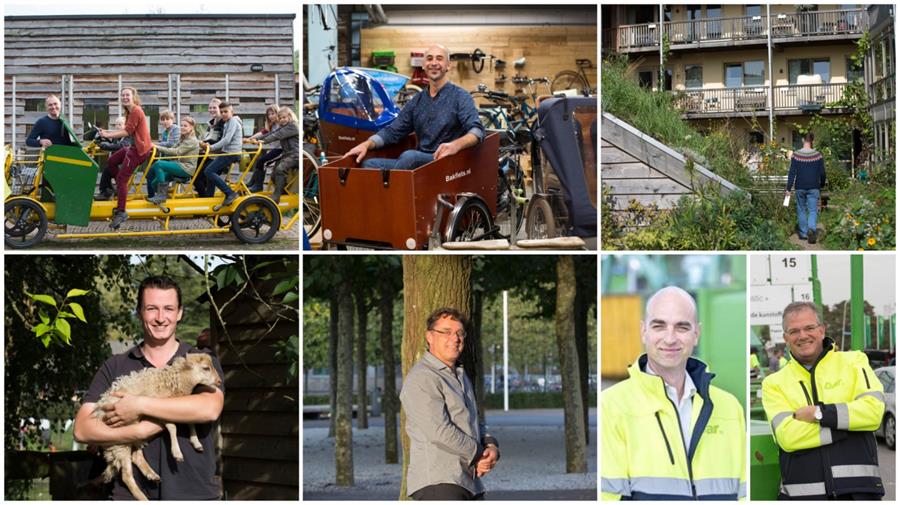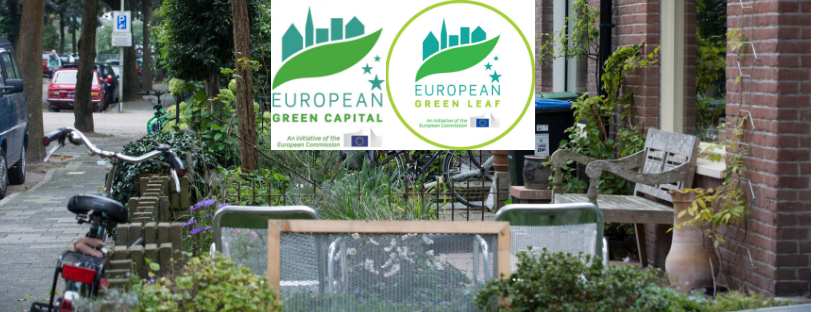
Ezine No. 28 – December 2018
Season’s Greetings!
We hope you enjoy the 28th issue of the European Green Capital and European Green Leaf Award’s Ezine. We at the European Green Capital and European Green Leaf Awards Secretariat would like to wish you all a wonderful holiday season and a very Happy New Year!
In this issue
- The Race is on for EGCA 2021 & EGLA 2020: Applicants Announced!
- EGCN Cities Sign Call for Action
- First ever EGCA and EGLA Recipe Book
- Members of the European Parliament Visit Nijmegen
- Faces of Nijmegen
- What is Oslo doing for 2019?
- First EGCN Workshop
- New artwork for Leuven
- Växjö on the world stage
The Race is on to find the 2021 European Green Capital and 2020 European Green Leaf Winners!
21 cities from 14 different European countries are officially competing to win the EGCA 2021 and EGLA 2020! Nearly two thirds of the applicant cities applied for the first time and most applications were received from Southern and Eastern European cities, which means that our EGCA and EGLA family is growing!
Who entered the race?
The following nine cities are competing for the European Green Capital 2021 Award: Budapest (Hungary); Cagliari (Italy); Dijon (France); Lahti (Finland); Lille (France); Skopje (Macedonia); Strasbourg (France); Tirana (Albania); and Västerås (Sweden).
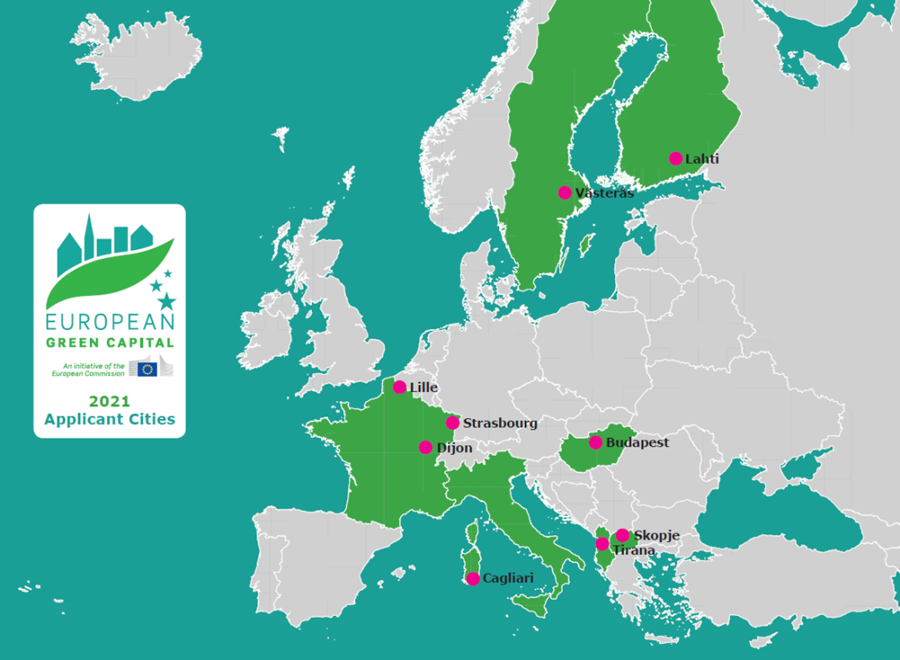
12 cities are in the running for the European Green Leaf 2020 Award, as follows: Avignon (France); Kaposvár (Hungary); Lappeenranta (Finland); Limerick (Ireland); Mairena del Alcor (Spain); Mechelen (Belgium); Oliveira do Hospital (Portugal); Svishtov (Bulgaria); Szentes (Hungary); Valmiera (Latvia); Viana do Castelo (Portugal); and Vranje (Serbia).
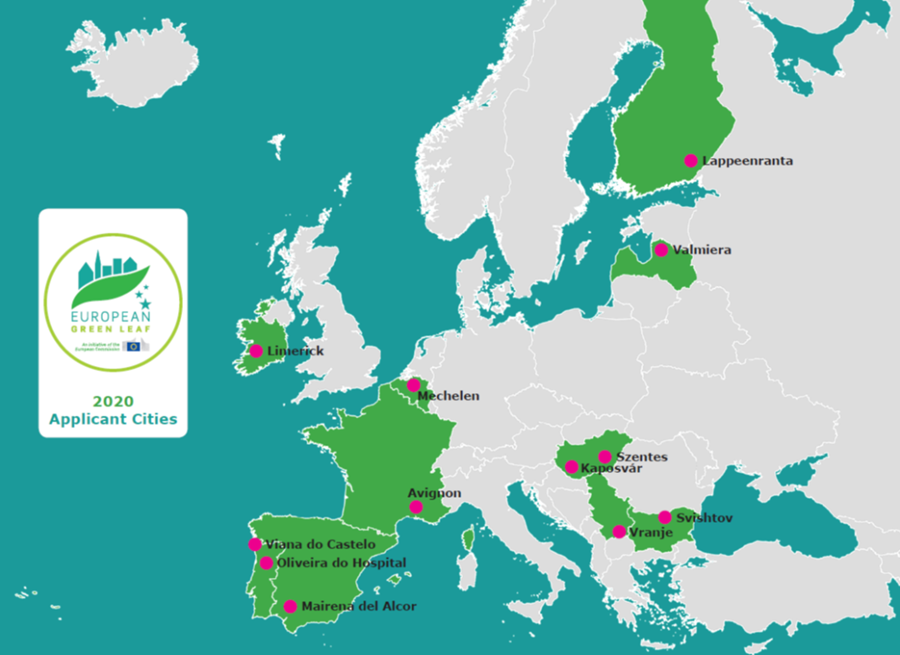
What happens next?
Each city’s application will be evaluated by an independent Expert Panel, who will then determine what cities will go on to the final stage of the competition. Finalists for each competition will be announced in April 2019, so stay tuned for the big reveal! For the latest information on the EGCA and EGLA competitions visit our website, or follow us on Facebook and Twitter.
European Green Capital Network Cities Sign Call for Action
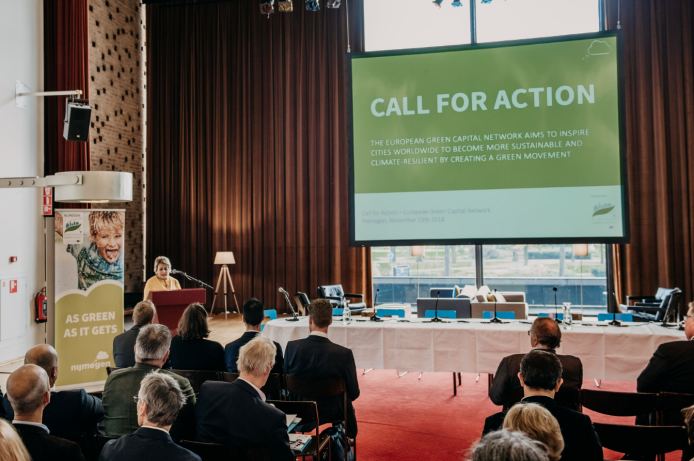
Joanna Drake, Deputy Director-General for Coordination of Resource-efficiency policies and instruments in DG Environment, speaking at Call for Action meeting
On 23 November 2018, Nijmegen, European Green Capital 2018, signed a ‘Call for Action’ together with 17 European Green Capital Network (EGCN) cities and 4 city partners, pledging to enhance sustainability in all cities around the world. The Call for Action seeks to inspire, calling on cities to recognise and act upon their role as drivers of sustainable development. In return, European Green Capital Network cities also offer to help other cities in their efforts to give sustainability a boost in their own city.
Mayors from the following cities of the EGCN signed the Call for Action: Amsterdam, Barcelona, Bristol, Essen, Freiburg, Ghent, Hamburg, ’s Hertogenbosch, Lahti, Lisbon, Ljubljana, Malmö, Nantes, Nijmegen, Nuremberg, Oslo, Umeå and Vitoria-Gasteiz. The Call for Action is endorsed by the European Commission and strongly supported by ICLEI (Local governments for sustainability), the Covenant of Mayors, Energy Cities and EUROCITIES.
With this Call for Action, these EGCN cities are emphasising the important role cities are playing in transforming their cities to tackle climate change in advance of COP 24, the Global Climate Change Conference in Katowice, Poland taking place from 3-14 December 2018. On 10 December, during the COP 24 reception “Katowice Climate Shift”, EGCN cities Nijmegen, Oslo (the 2019 European Green Capital) and Barcelona (tbc) will present the Call for Action and will call upon national governments and international institutions to acknowledge the important role of cities and involve them early in the process of developing policies.
Click here to read the full Call to Action and get inspired!
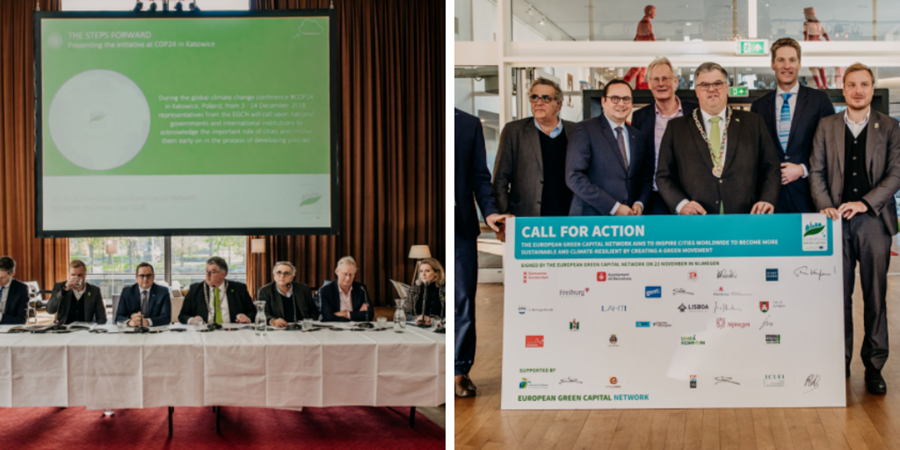
European Green Capital Network Representatives Presenting and Signing the Call for Action
First ever Recipe Book from EGCA and EGLA cities
We can probably all agree that one of the best things about travelling is trying new food! What if you could taste cuisines from all over Europe and learn about sustainable food practices, all from the comfort of your own home? Well, now you can! Introducing the first ever European Green Capital and European Green Leaf Network Recipe Book!
This unique recipe book contains 26 delicious recipes from 21 European cities that have either been finalists or winners of the European Green Capital or European Green Leaf Awards (i.e. cities from the EGCA and EGLA Networks). You could impress your friends and family with a Vegetable Loaf from Malmö; Cottage Cheese Pancakes from Ljubljana; or a Crème Caramel from Cornellà de Llobregat!
Another element that sets this recipe book apart is that all of the featured recipes are centred around sustainable food – but that’s not all! Readers can also enjoy inspiring stories about these cities’ sustainable food initiatives and how they are continually striving to be more ‘Fit for Life’!
Here’s a sneak preview of a recipe from the current European Green Capital, Nijmegen…
Feeling hungry yet? Visit our website for the full recipe book and start cooking!
Learn more about the European Green Capital Network (EGCN) & European Green Leaf Network (EGLN).
What’s happening in EGCA winning cities?
With the EGCA 2021 and EGLA 2020 competitions well underway, let’s now hear from our current (and future) winning cities!
Delegation of MEPs Visit Nijmegen
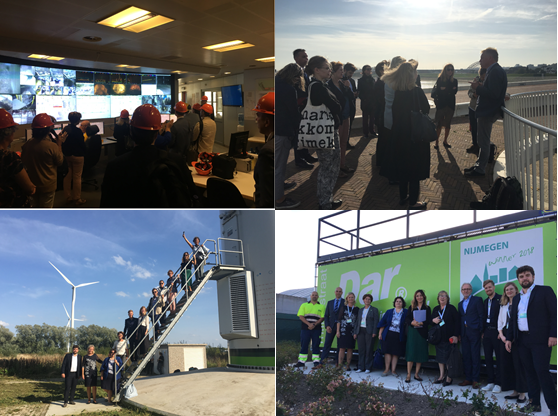
MEP Delegation Visiting Different Nijmegen Initiatives and Projects
In September, a delegation of four Members of the European Parliament, MEPs Bas Eickhout, Annie Schrijer Pierik, Renate Sommer, Elena Gentile, from the Environment, Public Health and Food Safety (ENVI) Committee of the European Parliament (EP) and EP advisors, visited this year’s European Green Capital, Nijmegen. They were welcomed to the green city by Nijmegen’s Vice Mayor Harriët Tiemens and spent three full days exploring the European Green Capital and discovering all about the different green initiatives in place in the city.
Over the course of their visit, MEPs visited some of the city’s sustainable projects, such as the first fully citizen-owned wind farm of the region, the Wind Park Nijmegen-Betuwe; the waste management centre and company, DAR; the impressive River Waal Project; and Innofase, an industry/synergy park where companies and the local municipality link up to achieve greater sustainability. Citizen action was emphasised throughout the visit and MEPs had the chance to meet with a wide variety of citizens who are working together on sustainable initiatives, to learn and discuss bottom-up approaches to sustainability policy in Nijmegen. The MEPs were very impressed by all of the sustainable initiatives they saw throughout their visit to the European Green Capital 2018, as well as the city’s energy and circular innovations. MEPs were particularly impressed with the level and scale of energy innovation seen in Arnhem at the Industrial Park Kleefse Waard (IPKW).
If you want to find out more about the visit, you can check out this link (in Dutch) or hear what MEP Annie Schreijer-Pierik has to say in this video clip.
The Faces of Nijmegen
Click on the image to read each story
Life in a European Green Capital is like no other! We spoke to six citizens from Nijmegen, the current European Green Capital, to find out more about what it’s like to live in a European Green Capital city, what benefits it brings to them and how they are playing their part in ‘greening’ Nijmegen. From running a nature kindergarten to living in an eco-village, these citizens show there are many different ways to be green! One thing these green Ambassadors all have in common: their passion for sustainability and making their city more ‘Fit for Life’!
Read these Nijmegen City Diaries for some greenspiration!
European Green Capital Network in Nijmegen
European Green Capital Network Members at First Workshop
Ever wondered what happens after cities win or are nominated for the European Green Capital Award? They join the European Green Capital Network, an exclusive network of former winners and nominees, which advocates for impactful sustainable urban development in Europe. To this end, members of the Network do not only exchange on best practices, challenges and potential solutions between each other, but they also encourage other European cities on their paths towards a more sustainable future, by providing guidance and support. The Network additionally serves as a platform for change, representing European cities in relevant European and global political processes.
On 20-22 November, the current European Green Capital, Nijmegen, hosted European Green Capital Network members for the 'Future-proof workshop'.
Workshop participants included experts on climate change adaptation, resilience and nature-based solutions from the member cities Barcelona, Bristol, Essen, Hamburg, Lahti, Lisbon, Nijmegen, Oslo, Reykjavik, Stockholm, Umeå, Vitoria-Gasteiz and ‘s-Hertogenbsch. Through the facilitated workshop sessions, input was gathered for the up-coming future-proof toolkit, which will soon be available on the European Green Capital Network webpage. The toolkit will provide recommendations and strategies for other European cities on their paths towards a more climate-proof and resilient future.
Click here for more information on the Network, its visions and plans for further up-coming workshops (topics and host cities soon to be announced) and toolkits.
Oslo Launches its 2019 Programme
As we come towards the end of Nijmegen’s year, Oslo is busy preparing for its green year as the 2019 European Green Capital! And when we say busy, we mean busy! The city already has over 300 events and activities planned for 2019, all with sustainability and citizen engagement at their heart. The programme is the result of a true collaborative effort. The city is working with over 150 partners, including grass-roots organisations, the business community and academic institutions.
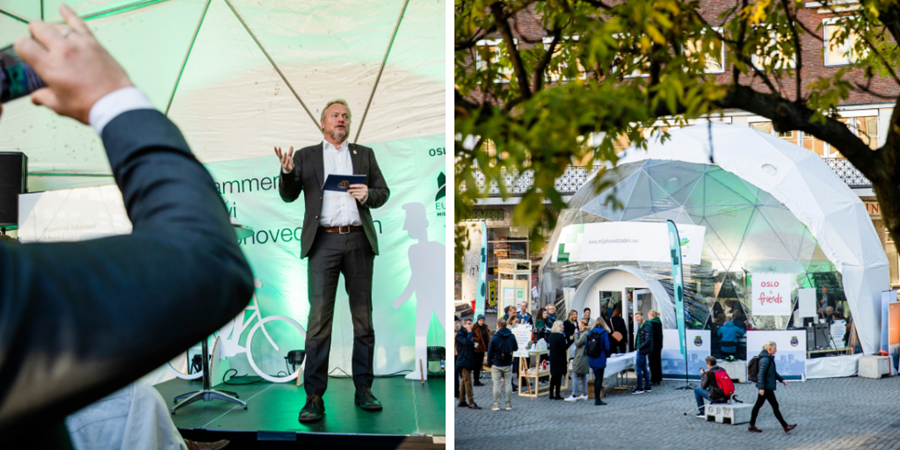
Governing Mayor of Oslo, Raymond Johansen, at the launch of Oslo’s European Green Capital 2019 Programme
The programme was officially launched on 25 September 2018 during Oslo Innovation Week with European Commissioner for Environment, Maritime Affairs and Fisheries, Karmenu Vella’s opening video message found here. Olso’s programme will include everything from international conferences to local neighbourhood events. Why not see for yourself - the full programme of events is available on the official website in Norwegianand English.
What’s new with the 2018 European Green Leaf winners?
Leuven’s new green leaf artwork!
Leuven has unveiled new public artwork to celebrate their green win! The sculpture is located in Sluispark, one of the city’s many green spaces. With its giant yellow characters, this artwork cannot be missed, serving as a constant reminder of Leuven’s achievement and encouraging citizens to keep working towards a healthy and sustainable future!
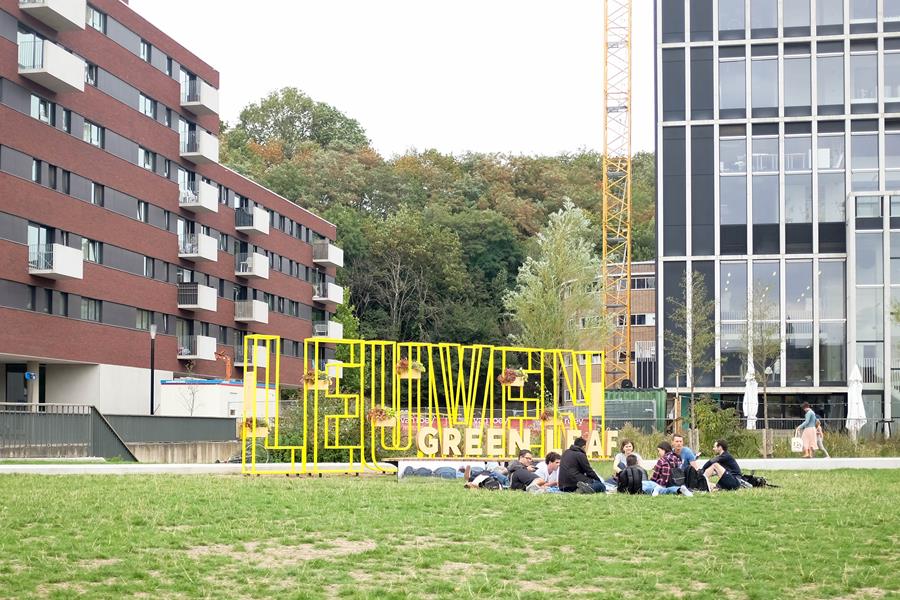
‘Leuven Green Leaf’ artwork in Sluispark
As well as brightening up the public space, the installation also includes a seating area, providing a place for people to come together, meet their neighbours and enjoy their city!
The artwork was officially unveiled on 26 August 2018 during Leuven’s Car-Free Sunday, one of the city’s many actions to promote sustainable transport and reduce carbon emissions.
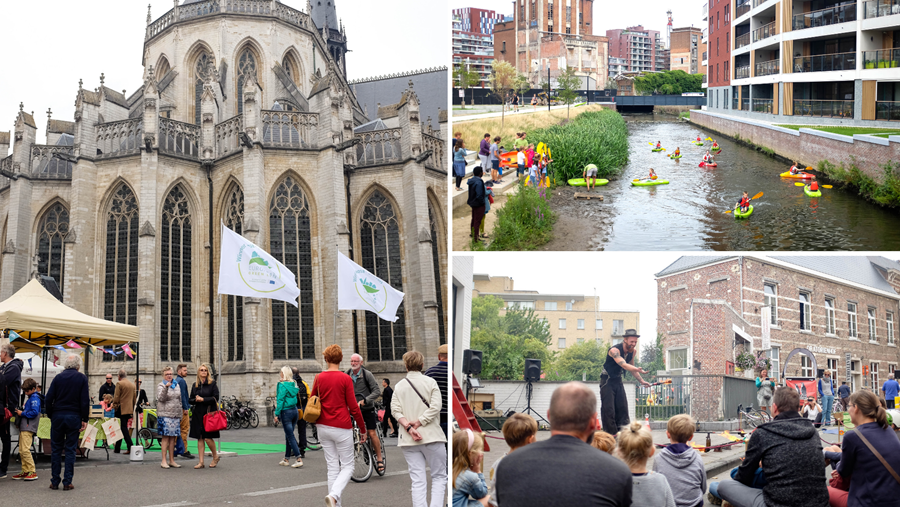
Leuven’s Car Free Sunday – celebrating the city’s public spaces with family fun and outdoor activities
Please visit Leuven’s website to find out more about all the great ‘green work’ they are doing in their city here.
Växjö leads the way in the fight against climate change!
Växjö gained worldwide media attention, including in Reuters and the World Economic Forum, following its announcement that greenhouse gas emissions have been cut at rates normally only seen after economic crashes or war. With the latest International Panel on Climate Change (IPCC) report affirming the urgent need for climate action, cities across the globe are now looking to role models, such as Växjö, to learn how they can reduce their emissions, while maintaining a thriving economy.
So, what can we learn from Växjö’s amazing feat? Prioritising cycling over motorised transport and promoting renewable energy across all sectors are just two examples of how the European Green Leaf is tackling climate change. Växjö has driven down CO₂ emissions by 58% per capita from 1993 to 2017, while energy use has dropped 12% per capita from 2008 to 2017. Looking forward, Växjö aims to eliminate carbon emissions from fossil fuels by 2030 from all sectors, including homes, industry and transport.
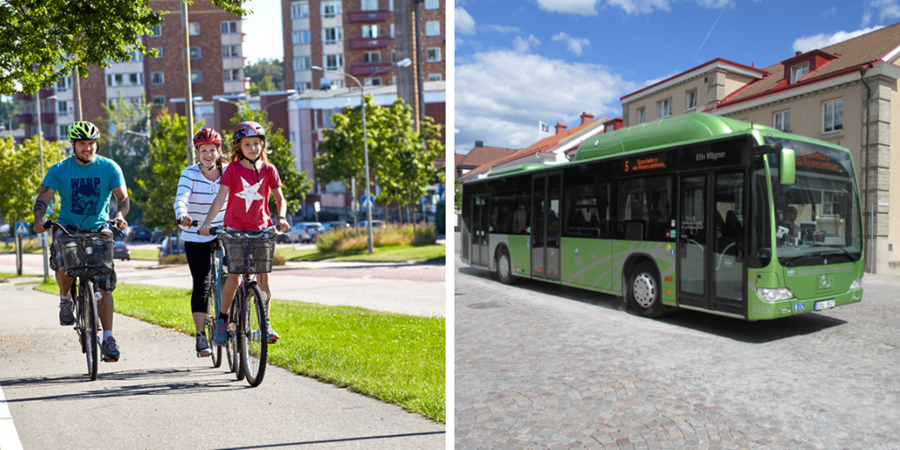
Växjö promotes sustainable transport through improving cycling infrastructure, increasing priority bus lanes and fuelling its public transport through renewable sources
Visit Växjö’s website to see all the initiatives the city has put in place and follow their lead towards a greener future!





